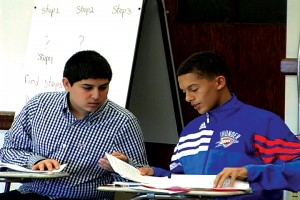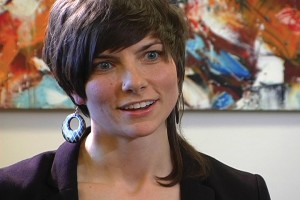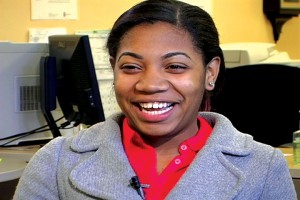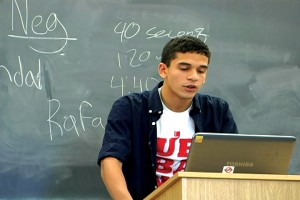 It is a coup d’état of sorts on a Saturday in late October — a peaceful coup as dozens of high school students have overtaken classrooms throughout Mount Pleasant High School, where they will spend the day debating.
It is a coup d’état of sorts on a Saturday in late October — a peaceful coup as dozens of high school students have overtaken classrooms throughout Mount Pleasant High School, where they will spend the day debating.
They are part of the Rhode Island Urban Debate League, formed in 1999 for high school students from Providence, Pawtucket, Central Falls and Woonsocket.
“I so firmly believe that there is no activity that can better prepare a young person for virtually anything they want to do,” said Ashley Belanger, who came to Rhode Island six years ago to become the organization’s first executive director.
Belanger watches a similar transformation year after year. “I’ve seen students come from shy freshmen to enter the most advanced form of debate at the national tournament.”
Rafael Torres was one of those shy freshmen. To listen to him at a tournament held at Brown University, you’d never know he had overcome a huge stuttering problem.
“Debate is amazing. It’s literally changed who I am. It wasn’t until about sophomore year when I started debating, when I grew from not being able to say a sentence without stuttering to now when I can give speeches at debate without having a problem.”
 The league’s format is what’s called policy debate — a resolution created at the beginning of the season and debated throughout the year. It is not easy. The participants have to put in hours of preparation, then during the day-long tournaments stand up before an adult judge and opponents and give four 8-minute speeches in each round, sometimes going three or four rounds in a single day. And they face cross examination from the opposing side.
The league’s format is what’s called policy debate — a resolution created at the beginning of the season and debated throughout the year. It is not easy. The participants have to put in hours of preparation, then during the day-long tournaments stand up before an adult judge and opponents and give four 8-minute speeches in each round, sometimes going three or four rounds in a single day. And they face cross examination from the opposing side.
 Genesis Sanchez, who came to the United States from the Dominican Republican at the age of 10, went from knowing no English to participating at a national tournament. “English was a foreign language to me,” she said. “I had no clue it even existed. I feel like I learned English because of the determination I had to finally understand what people were saying. I just didn’t want to be there clueless. I wanted to know because I wanted to partake in all of these things.”
Genesis Sanchez, who came to the United States from the Dominican Republican at the age of 10, went from knowing no English to participating at a national tournament. “English was a foreign language to me,” she said. “I had no clue it even existed. I feel like I learned English because of the determination I had to finally understand what people were saying. I just didn’t want to be there clueless. I wanted to know because I wanted to partake in all of these things.”
Sanchez, now a freshman at Rhode Island College, is studying to become a criminal prosecutor. She went to both state and national tournaments during her time at Juanita Sanchez High School, where her debating skills become well known and the little girl who didn’t know how to speak English was long forgotten.
Kendall Hall, a high school sophomore, participated in a summer camp the Urban Debate League runs in August. The kids spent a week at a building on the Brown University campus getting a taste of what they can expect in the fall. Call it boot camp with a lot of fun added in.
“I think I’ve changed a lot,” Hall said. “I can actually speak in front of a camera now. I would never have been able to do that in 9th grade. I’ve become more social. I can talk more. I can do public speaking better.”
Torres says he sees a lot of himself in the younger debaters.
 “There are kids who just come in who are shy, don’t want to talk and they’re just like, ‘I don’t know what policy is,’ and they just throw their hands in the air. Then after a few weeks or months I step into their classes and they’re arguing with their teacher. And a lot of that growth is because of debate.”
“There are kids who just come in who are shy, don’t want to talk and they’re just like, ‘I don’t know what policy is,’ and they just throw their hands in the air. Then after a few weeks or months I step into their classes and they’re arguing with their teacher. And a lot of that growth is because of debate.”
Sanchez says it goes beyond debating. “I consider it a debate family. And you just get to know all of these different people who you otherwise would not have met because you would have stayed in the circle of your school.”
Torres doesn’t know what the future holds, but knows his years debating will help prepare him for whatever it is. “I’ve done plenty of other things, but everything stems from debate. Debate gave me the ability to speak my mind, speak clearly and think about what I’m’ saying before I say it. All the speech practice before debate became the foundation for where I am now.”
If you want to see the video version of this story go to www.hummelspotlight.org. If you know of a person or organization who you think deserves the Spotlight, send an email to info@hummelspotlight.org


